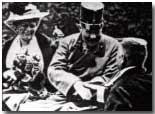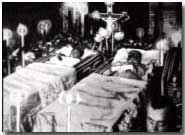Who's Who - Archduke Franz Ferdinand
 Franz Ferdinand (1863-1914)
was born in Graz, Austria. As the heir to the Austro-Hungarian empire
his assassination on 28 June 1914 sparked the First World War.
Franz Ferdinand (1863-1914)
was born in Graz, Austria. As the heir to the Austro-Hungarian empire
his assassination on 28 June 1914 sparked the First World War.
Although only third in line to the throne, Franz Ferdinand became the heir-apparent following the death of the Emperor's son, Crown Prince Rudolf in 1889, and his own father Archduke Charles Louis in 1896, Franz Josef's brother. Considered a prideful and mistrusting man, and not overly cultured, and with a short temper, Franz Ferdinand lacked the necessary charisma to guarantee popularity.
Following his marriage to Sophie Chotek von Chotkova in 1900, Ferdinand became more reclusive. A happy husband and a devoted father (they had three children), Ferdinand's private persona in this regard was at odds with public perception. The Emperor, Franz Josef, was against the marriage, arguing that Franz Ferdinand was marrying beneath his station. The marriage eventually only took place after Ferdinand agreed to renounce all rights of succession for his children. Franz Josef did not attend the wedding.
The primary source of Franz Ferdinand's unpopularity however related to the policies he intended to apply once he assumed the throne. He proposed to replace Austro-Hungarian dualism with 'Trialism,' a triple monarchy in which the empire's Slavs would have an equal voice in government with the Germans and Magyars.
Ferdinand was also considering the idea of a federalism made up of 16 states; the aim being to avoid disintegration of the fading Austro-Hungarian empire. However these ideas were not popular among the ruling elite.
 As
Inspector General of the army Franz Ferdinand accepted an invitation from
General Oskar Potiorek to visit the capital of Bosnia, Sarajevo, to inspect
army manoeuvres. Bosnia - and Herzegovina - were provinces that had
been under Austro-Hungarian administration since 1878, by international
agreement. Austria annexed the provinces outright in 1908, a
controversial move which upset governments in the west; however,
Greater-Serbia proponents were outraged. They wanted the provinces to
be part of a Serbian led pan-Slav state, rather than part of the
Austro-Hungarian empire.
As
Inspector General of the army Franz Ferdinand accepted an invitation from
General Oskar Potiorek to visit the capital of Bosnia, Sarajevo, to inspect
army manoeuvres. Bosnia - and Herzegovina - were provinces that had
been under Austro-Hungarian administration since 1878, by international
agreement. Austria annexed the provinces outright in 1908, a
controversial move which upset governments in the west; however,
Greater-Serbia proponents were outraged. They wanted the provinces to
be part of a Serbian led pan-Slav state, rather than part of the
Austro-Hungarian empire.
A Serbian terrorist group, the Black Hand, resolved to assassinate Franz Ferdinand during his visit to Sarajevo on 28 June 1914, thereby stalling his proposed reforms.
While riding in the motorcade through the streets of Sarajevo on 28 June, Franz Ferdinand and his wife Sophie were shot and killed by Gavrilo Princip, a Bosnian member of the Black Hand; earlier in the day Ferdinand's car had also been fired at by a hand grenade, causing him to complain angrily upon his arrival at the city hall.
"What is the good of your speeches? I come to Sarajevo on a visit, and I get bombs thrown at me. It is outrageous!"
Archduke Franz Ferdinand interrupting the Mayor's welcome speech at Sarajevo's city hall, 28 June 1914.
The assassination provided Austria-Hungary with an excuse to take action against Serbia. During July 1914 the situation escalated, pulling in the major European powers via the complex alliance relationships each had struck up with one another. The result was world war.
Franz Ferdinand was buried in a crypt beneath the chapel of his castle, Artstetten, instead of the customary burial place of the Hapsburgs, Capuchin Crypt, in Vienna. Neither Franz Josef nor the German Kaiser attended the funeral.
Click here to view film footage of Archduke Franz Ferdinand arriving at Sarajevo's Town Hall on 28 June 1914. Click here to view footage of Ferdinand's funeral.
"Boche" was a disparaging term used to describe anything German.
- Did you know?
